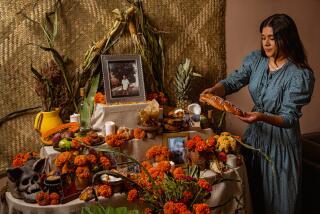The Role of a Lifetime
IZTAPALAPA, Mexico — Pedro Limon has been sinfully busy this year. When he wasn’t at his restaurant manager job, he was jogging or lifting weights. In the wee hours, he studied the Bible and watched religious movies. On weekends, it was church and talks with his priest. And in all these months, he didn’t have a single shot of tequila or a date with a girl. If you want to be Jesus during Easter, expect to make sacrifices.
After winning a competition to play the role of Jesus, the 26-year-old Limon donned a white robe, a beard and long, fluffy wig, and solemnly walked through the streets last week in Mexico City’s oldest and most traditional Passion play processions. He trained for four months for the spiritual and physical demands of leading the parades that were expected to draw 3 million spectators to the neighborhood of Iztapalapa. The biblical Mary and Peter were no slackers either, practicing their lines and studying the Bible to make spiritual links to their characters.
Their efforts demonstrate an idiosyncrasy of a working-class community in modern-day Mexico City where Catholic traditions with an indigenous flair shape civic life as they have since the Spaniards conquered Mexico.
Though there are many processions that mark Holy Week in Mexico and in Latino neighborhoods in the United States, Iztapalapa’s have reached epic proportions, with its 150 players dressing in ever more ornate, detailed costumes as the years pass.
Iztapalapa, which gets its name from an indigenous Nahuatl word that refers to how the city was built atop fill dirt over water, is a gritty sprawl of 2 million people in southeast Mexico City. They convert their neighborhood each year into a stage for reenactments of the Last Supper, Jesus’ arrest and trial and the Crucifixion. A citizen group, not the church, takes the helm of the festivities. Beginning in January, the nine-member committee conducts tryouts for the major parts. Limon was picked over 14 other young men.
The rules stipulate that Jesus must be about 5 feet, 7 inches, unmarried, have no tattoos and be a native of Iztapalapa. Once those requirements are met, committee members delve into the moral character of the contestants and their families. The winners of the roles must participate in workshops and rehearsals, raise money for procession costs, pay for their costumes and help decorate the scenes.
“What we want is someone who understands the idiosyncrasies of this event and wants to live the part, not just play it,” said Tito Emeterio Dominguez, president of the committee for this year’s procession, the city’s 159th.
Limon says he was indeed such a person. While other Mexicans were taking off for beaches during the national Holy Week, he concentrated on his training.
Iztapalapa’s Jesus gets his strength not only from his soul, but from his sweat. Limon, usually clad in a suit and tie 60 hours a week, changed into sweats and a T-shirt to jog and lift weights for several hours each day. The exercise prepared him to carry a 40-pound cross for about three miles, remain strapped to the cross for about 30 minutes and climb a grassy knoll for the Crucifixion scene.
Like the others in the major roles of the play, Limon was glad for the chance. For years, they watched the Easter processions from their front steps and dreamed of a chance to be Jesus, Judas, Mary or even Veronica, a bystander who wiped Jesus’ face and kept the cloth that the faithful believe was evidence of his divinity.
“This is a big role that I have dreamed about since I was a child. I did everything to do the best I could do,” said the 5-foot-9 Limon. “To me, it’s a sacrifice that has a meaning, and it brings me closer to my religion.”
After work, he’d flip through the Bible, the scripts and even watch movies such as the 1977 “Jesus of Nazareth,” starring Robert Powell.
Incorporating Spanish, Indigenous Traditions
Homero Aridjis, a renowned Mexican author and poet who recently was a visiting professor at UC Irvine, said Iztapalapa’s residents envelop themselves in the Passion plays because they are brought up to do so. The plays incorporate Spanish and indigenous traditions and are uniquely Mexican, he said.
“If this were in Spain, it would be a very serious, upright production. Here, it takes on an open-air market quality where people sell food as they watch the processions,” he said. “The youth consider this an honor, and they do whatever it takes. It’s a sign of status and honor.”
The community hopes by 2003 to expand on its Easter renown to draw tourists all year. Its plans include creating a Passion museum, erecting a huge cross and putting up sculptures of the key biblical figures.
About 2,000 people watched the procession on Palm Sunday, a virtual dress rehearsal for the better-attended events last Thursday and on Good Friday.
Wearing one of two $500 velvet tunics he bought, Limon confidently strode through three miles of streets flanked with palms held by purple-robed “Romans,” youngsters who walk the procession barefoot or wearing sandals.
Limon remained stone-faced as he moved in seeming slow motion with his hand in the air through a market area scented by onions, cilantro, oranges and sausage, and toward the gritty neighborhood church for Mass.
Right behind him was the Virgin Mary, robed in blue velvet. She is Erika Yasmin Mendez Reyes, the 21-year-old daughter of a fruit vendor who moonlights as a band singer.
“She’s had this as a goal for many years. Some of it is just because this is a tradition here, but I think she likes the spotlight like her father,” said her mother, Leticia Reyes, as she proudly followed the procession for two hours.
After paying $300 for her costume, Mendez’s biggest fear was how she might look in front of the whole town with no makeup. Mary Magdalene was the only character allowed to use any cosmetics, fake nail tips. Though she was honored to get her role, Karla Vividiana Hernandez Garcia, a 19-year-old social work student and assistant in Iztapalapa’s parks department, says she has missed her boyfriend these four months.
She stopped smoking and walked several miles a day to get in shape. When her mother was hospitalized, she barely had time to care for her because of the demands of her role, her job and her studies. She had auditioned to be Veronica, a role her aunt played years ago, but was elevated to Mary Magdalene.
“What was really hard was not being with my mom and then telling my boyfriend that we could not see each other for a while,” Hernandez Garcia said. “I told him that this is important because it is our culture, our tradition. It’s for the love of my beliefs.”
He Gave Up Partying to Be an Apostle
Last week, the Apostle Peter had to beg off a family party where he would have likely dipped into a bottle of tequila. “My dream to be in this was important. It’s only a few months of sacrifice,” said Gabriel Rueda, the 20-year-old veterinary student and used-car salesman who plays Peter.
Rueda and others often have family members who have participated in past years. Brother Joaquin Rueda, a 23-year-old teacher, played Jesus in 2001, an experience he says changed his life. Like Limon, he regularly jogged and went to the gym. He walked miles carrying wood to train for the big day. He was on a tight schedule as he finished his university studies, held down a full-time job and studied for his part. In the end, it wasn’t the physical training that left its mark, he says. It was the spiritual exercise that continues to help him make decisions in life. He says he goes to fewer parties and spends more time reading the Bible and other books.
Gerardo Granados, who played Jesus in 2000, said that while many young Mexican adults seem to be distancing themselves from the church, he has come closer. “We do not have to be Jesus. What we try to do is follow his teachings. Of course, we are humans and we sin, but the church tells us that we can be forgiven.”
Osvaldo Mendoza, the 1999 Jesus, said his experience led him to get a better job as a bus driver. Now, when faced with conflict, “I think more before I act and I act according to what I learned. The training, the sacrifice that I made, is something that I will never forget.”
More to Read
Sign up for Essential California
The most important California stories and recommendations in your inbox every morning.
You may occasionally receive promotional content from the Los Angeles Times.










